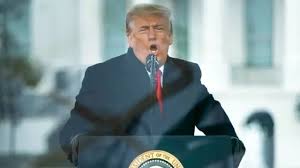Former U.S. president Donald Trump has threatened to sue the BBC after the broadcaster admitted it made an “error of judgment” in editing one of his speeches for a documentary.
Editing controversy sparks backlash
The dispute centres on a 2024 episode of the BBC’s flagship programme Panorama, which aired in the lead-up to the U.S. presidential election. The documentary featured excerpts of Trump’s 6 January 2021 speech in Washington, but sections of the address were edited together in a way that appeared to show him directly urging supporters to storm the U.S. Capitol.
BBC chair Samir Shah has since acknowledged that the broadcast misrepresented the sequence of events, saying in a statement to UK lawmakers: “We accept that the way the speech was edited did give the impression of a direct call for violent action. The BBC would like to apologise for that error of judgment.”
Trump’s reaction and legal threat
Trump responded with outrage, accusing the BBC of deliberately distorting his words to influence public opinion ahead of the U.S. election. Writing on his social platform, he described the edit as “a terrible thing for democracy” and suggested the broadcaster had “stepped on the scales of a presidential election.”
He has instructed his legal team to explore a potential lawsuit, alleging defamation and election interference. The BBC has said it is reviewing the issue internally but declined to comment on possible litigation.
Leadership turmoil at the BBC
The fallout has already led to resignations at the top of the organisation. Director-General Tim Davie and News Director Deborah Turness both stepped down following an internal review into editorial standards. The corporation now faces mounting political and public scrutiny over its impartiality and decision-making processes. More than 500 formal complaints have been lodged concerning the Panorama broadcast.
Broader implications for public media
The episode has reignited debate about the BBC’s editorial independence and its influence over international audiences. In the UK, critics argue that the incident undermines the broadcaster’s credibility as a taxpayer-funded institution. In the United States, Trump’s legal threat adds a transatlantic dimension to concerns about media bias and accountability.
Observers note that the controversy could prompt reforms in the BBC’s governance model, with potential changes to oversight procedures and external review mechanisms aimed at restoring public trust.
Looking ahead
Should Trump proceed with legal action, the case could test the limits of cross-border defamation law and the protections afforded to public broadcasters. For now, the BBC’s priority will be damage control, as it seeks to reassure both domestic and global audiences of its commitment to fairness and accuracy.
Newshub Editorial in Europe – 2025-11-10



Recent Comments